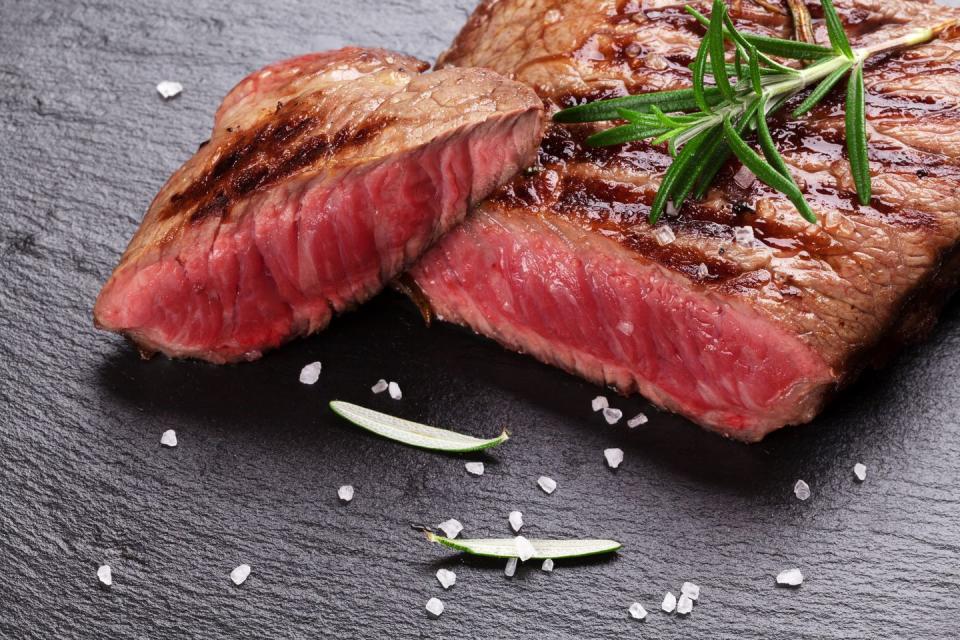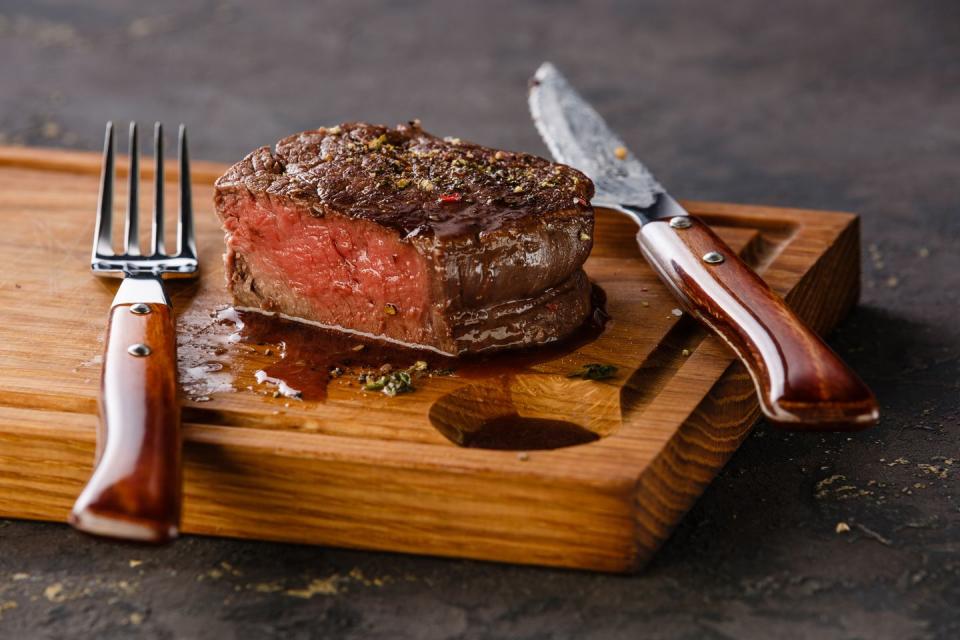What You Need to Know About the Carnivore Diet

The carnivore diet is an extreme eating plan that calls for consuming just beef, water, and salt.
It can lead to vitamin and mineral deficiencies that cause bone loss and organ damage or failure.
Eating more vegetables and plant-based food is a better nutritional and environmental choice.
Just in case we hadn’t gotten our fill of meat-based diets lately — we see you, keto — the carnivore diet or "lion diet" has arrived. The diet, which excludes veggies, fruit, beans, nuts, seeds, and dairy, is hailed as a weight loss and autoimmune disease "cure" by its proponents — namely Mikhaila Peterson, blogger extraordinaire and daughter of lifestyle "guru" Jordan Peterson.
Carnivore enthusiasts tout the life-changing benefits of their demanding diet, which includes consuming beef, water, and salt only. Variations of the diet include adding eggs, dairy, spices, and coffee, but the gist is clear: The carnivore diet is all about eating mainly meat. Other important components? Infrared saunas (extreme heat) and cryotherapy (extreme cold), both of which proclaim metabolic benefits when used regularly.
Why You Shouldn’t Try It
What this trend lacks in scientific backing, it makes up for in die-hard enthusiasm among beef believers. But social media followings shouldn't obscure all the reasons why a carnivore diet isn't a good idea.
There is no scientific evidence proving it's safe.
While overarching research findings support the concept that low-carb eating plans can expedite weight loss, few have been studied for longer than a year to evaluate their efficacy and safety for lifelong use.
But this diet isn’t just a low-carb plan — it’s a completely exclusionary plan that's exceptionally restrictive for everyone. There’s no way to survive on a meat-only diet without suffering some serious health problems. Vitamin and mineral deficiencies can result in unnecessary physical pain, bone loss, organ damage, and, ultimately, organ failure.

You're skipping the most nutrient-packed foods on the planet.
While many low-carb lovers may be tempted to take things to the next level, the carnivore diet implies that 0% of your calories come from dietary carbohydrates — a practice that's highly unsustainable for the long haul. Even the delicious, nutrient-packed "low-carb" foods you’d normally green light, like spinach, almonds, salmon, and avocado are off the menu.
Across the board, diets high in vegetables, fruit, plant-based oils, nuts and seeds, whole grains, legumes, and some dairy products are some of the most nutritious in the world — ones that have been specifically touted for their autoimmune benefits. For example, the Mediterranean diet encourages plant-based foods above all else, and has been linked to reducing chronic disease risk in a plethora of populations. That’s because produce is filled with plant-based antioxidants called phytonutrients not seen in animal products.
It's not a smart way to lose weight or alleviate any symptoms.
Any weight loss that carnivores have seen as a result of going all meat, all the time? It’s likely due to the calorie restriction, which is nearly impossible to avoid if you’re cutting out nearly all food groups!
And if you're curious about trying the diet to "treat" an ailment, elimination diets are supposed to be temporary and conducted under the tutelage of a physician and/or dietitian. After identifying the foods that may personally trigger symptoms of autoimmune disease, other food groups are slowly added back in to your diet so you’re not missing out on anything you need for a prolonged period.

Eating only meat is terrible for the environment.
Even if you could keep up with an bunless-burger diet for life, there are still some other reasons I’d strongly discourage you from going carnivore. Relying on animals as your sole source of sustenance is not just tough on you physically. It’s not so great for the long-term health of the environment either. Agricultural practices continue to improve in terms of environmental responsibility and preservation, but they still contribute about 30% of the total global greenhouse gas emissions — not to mention the water and land required to keep livestock production ongoing!
All that restriction probably isn't great for your mental health.
The mental and emotional difficulty of staying on a diet this extreme can be downright debilitating for most people. While I’m normally in favor of supporting anyone and everyone in their eating styles, I’m highly opposed to the idea that better health and weight loss can only or best be achieved through deprivation and restriction.
No single food or nutrient that can make or break your progress when consumed in isolation. In order to achieve health and happiness, we have to make choices that promote a balance of mental and emotional enjoyment and physical, life-sustaining nutrition.
The Bottom Line: Steer clear of a meat-only diet. Eating more vegetables and plant-based foods is universally a better choice for both you and our planet.
You Might Also Like

